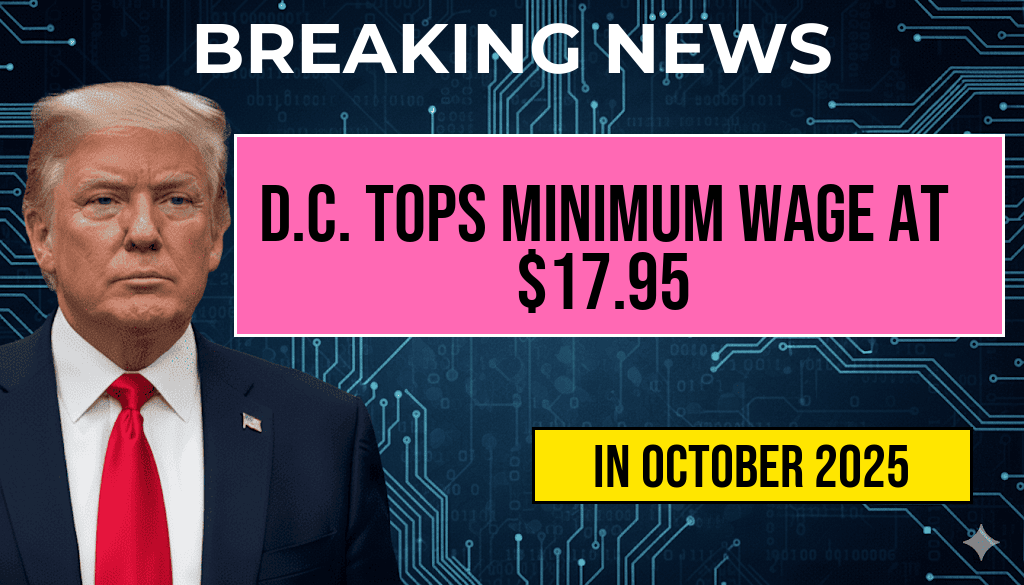Washington D.C. has solidified its position as the U.S. city with the highest minimum wage, setting the bar at $17.95 per hour. This increase reflects the district’s ongoing efforts to address economic disparities and improve living standards for low-wage workers. The adjustment, which took effect at the start of the year, surpasses the minimum wages of other major cities like Seattle and San Francisco, positioning D.C. as a leader in regional wage policies. The move comes amid broader discussions about the economic impact of rising wages, with policymakers emphasizing the importance of a living wage in fostering economic stability and reducing poverty. Local officials highlight that this increase aims to support essential workers, including those in hospitality, retail, and public service sectors, who often face the highest cost of living. As the minimum wage landscape continues to evolve nationwide, Washington D.C. remains at the forefront of the movement toward fairer compensation standards.
Overview of Washington D.C.’s Minimum Wage Policy
Recent Wage Adjustments
The district’s minimum wage has steadily increased over the past decade, driven by legislation aimed at aligning wages with inflation and cost of living. The latest adjustment, enacted through the District of Columbia Minimum Wage Act, raises the hourly rate from $16.10 to $17.95. This marks a significant boost, approximately 11.8%, designed to better support workers amidst rising housing costs and inflationary pressures.
Factors Influencing the Increase
- Cost of Living: Washington D.C. consistently ranks among the most expensive cities in the U.S., with housing and transportation costs driving the need for higher wages.
- Legislative Initiatives: The district’s government has prioritized wage increases through legislative measures, aiming to reduce economic inequality.
- Economic Recovery: Post-pandemic recovery efforts have included wage hikes to bolster consumer spending and economic resilience.
Comparison with Other Major U.S. Cities
| City | Minimum Wage | Effective Date |
|---|---|---|
| Washington D.C. | $17.95 | January 2024 |
| Seattle, WA | $16.78 | January 2024 |
| San Francisco, CA | $16.99 | January 2024 |
| New York City, NY | $15.00 | December 2023 |
| Chicago, IL | $15.00 | January 2024 |
While other large cities have implemented ambitious minimum wages, D.C.’s rate remains the highest nationally, reflecting its unique economic challenges and political commitment to wage growth. The higher wage threshold also influences nearby jurisdictions, prompting discussions on regional wage standards and economic competitiveness.
Economic and Social Impacts
Benefits for Workers
Proponents argue that a higher minimum wage directly improves the financial stability of low-income workers, enabling better access to housing, healthcare, and education. According to studies by the Wikipedia entry on minimum wage, increased wages can lead to reduced employee turnover and higher productivity, benefiting employers in the long term.
Business Response and Challenges
Some business owners express concerns about increased labor costs, especially small enterprises with tight profit margins. Critics warn that wage hikes could lead to higher prices for consumers or reduced employment opportunities. However, data from jurisdictions with rising wages suggest that job losses are typically minimal when increases are phased in gradually.
Broader Context and Future Outlook
State and Federal Trends
Washington D.C.’s wage policies align with a broader national trend toward higher minimum wages. Several states have set their minimum wages above the federal level of $7.25 per hour, with California, New York, and Massachusetts leading the way. The federal minimum wage has remained unchanged since 2009, though legislative proposals for increases continue to circulate in Congress.
Potential Policy Developments
As economic conditions evolve, policymakers in D.C. and across the country are debating future adjustments. Discussions include plans to implement a living wage standard, potentially tying minimum wages to regional measures of affordability. Stakeholders remain divided on the pace and scale of these changes, balancing economic growth with social equity objectives.
Sources and Further Reading
- Wikipedia: Minimum wage
- Forbes: Washington D.C. Raises Minimum Wage to $17.95
- U.S. Bureau of Labor Statistics
Frequently Asked Questions
What is the current minimum wage in Washington D.C.?
The current minimum wage in Washington D.C. is $17.95 per hour, making it the highest among U.S. states and territories.
How does Washington D.C.’s minimum wage compare to other states?
Washington D.C. leads with the highest minimum wage in the country at $17.95 per hour, surpassing most states and territories.
When did Washington D.C. implement this minimum wage rate?
Washington D.C. recently raised its minimum wage to $17.95 per hour, reflecting ongoing efforts to improve wages for workers in the area.
Who is affected by the minimum wage increase in Washington D.C.?
The minimum wage increase impacts workers in low-income jobs across various sectors, including retail, hospitality, and service industries within Washington D.C.
Are there plans to further increase the minimum wage in Washington D.C.?
There are ongoing discussions and legislative efforts to continue increasing the minimum wage in Washington D.C., aiming to keep pace with living costs and economic growth.

Leave a Reply